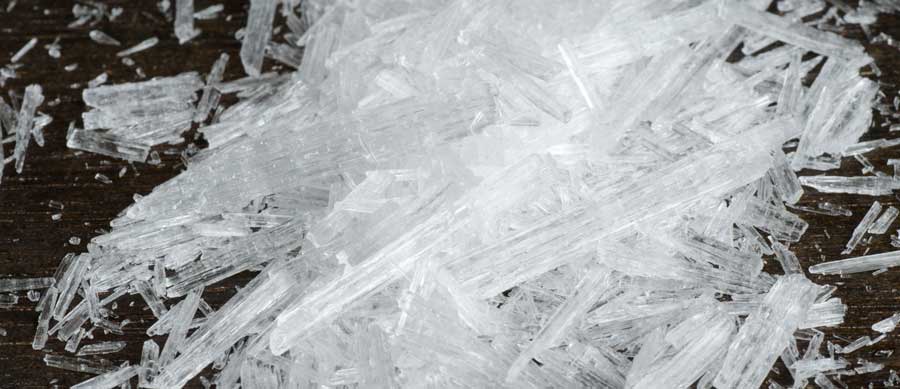Methamphetamine abuse is back with a vengeance, according to media reports from the New York Times. Following the Combat Methamphetamine Act that was passed by Congress in 2005, methamphetamine abuse and cases had dropped drastically. But now, meth seizures are on the rise again across the nation, especially in San Diego, where more than 20,000 pounds of methamphetamine was seized by authorities in 2016. That’s compared to less than 5,000 pounds seized in 2006.1
Methamphetamine is a stimulant drug that is chemically similar to amphetamine, a drug used to treat ADHD and narcolepsy. It is used as a white powder, pill, or in crystal form by inhaling, swallowing, snorting, or injecting the powder after dissolving it with water.2
The effects of methamphetamine are felt very quickly and users experience a rush of dopamine to the brain that causes an intense feeling of euphoria. Due to this drug’s strong effects and fast-acting rush that users feel, many of them take repeated doses for days on end, neglecting food, sleep, and other essential aspects of life.
Side Effects of Methamphetamine Abuse
The short-term effects of methamphetamine abuse are similar to that of other stimulants.3 They typically include:
- Increased breathing
- Decreased appetite
- Increased physical activity
- Rapid and/or irregular heartbeat
- Increased blood pressure
- Increased body temperature
Although meth users may find the short-term effects of the drug to be pleasurable, methamphetamine has many negative long-term effects. Since the immediate effects of meth use are pleasurable and fast-acting, many people who abuse it develop a tolerance and become addicted. This fuels chronic abuse of methamphetamine, which comes with serious consequences over time.
People who abuse meth regularly over long periods of time are much more likely to get HIV/AIDS, hepatitis B and C, or contract sexually transmitted diseases.4 Other consequences of long-term meth abuse include:
- Anxiety
- Confusion
- Insomnia
- Extreme weight loss
- Severe mood swings
- Psychotic behaviors
- Violent behaviors
- Cognitive problems
- Memory loss
- Severe dental problems
Suddenly stopping all use of methamphetamine can result in severe withdrawal symptoms. The safest way to stop using methamphetamine safely is to do so under medical and clinical supervision. A medically assisted drug detox program can provide the professional assistance and supervision required to safely, effectively, and comfortably detox from methamphetamine.
Signs, Symptoms, and Causes of Methamphetamine Addiction
Methamphetamine addiction is typically a result of repeated meth use, although a person may even become addicted after just one use. Due to the fact that it’s a highly addictive drug, many people struggle to stop using it once they’ve started, as uncomfortable withdrawal symptoms like anxiety, fatigue, depression, and cravings typically drive them to use meth again.
The signs of drug addiction will vary from person to person, but most often, if a person is addicted to methamphetamine, he or she will display some or all of the following signs5:
- Stealing money or valuables to fund a methamphetamine addiction.
- Being unable to stop using methamphetamine even after trying.
- Getting into dangerous or life-threatening situations while under the influence of methamphetamine.
- Neglecting important responsibilities at home, school, or work.
- Exhibiting extreme changes in appetite, sleep patterns, and hygiene habits.
- Losing a large amount of weight very quickly.
- Suddenly spending a lot of time with a new set of friends.
- Losing interest in hobbies and activities you used to enjoy.
- Developing a tolerance (needing more methamphetamine to achieve the same effects).
Although there are certain factors that increase a person’s likelihood of becoming addicted to drugs, anyone can develop a tolerance and addiction to methamphetamine. No one is immune. If you believe that you or a loved one is addicted to meth, you should seek help immediately, as the long-term effects of any type of drug abuse can be devastating and deadly.
Methamphetamine Addiction and Detox Treatment
Most individuals seeking treatment for methamphetamine addiction will need to complete a medically assisted drug detox program before they can enter a rehab program. The primary purpose of detox is to cleanse the body of harmful toxins left behind by the drug(s) and help the client achieve a stable sober state so they can begin healing physically, mentally, and emotionally.
During detox at Hill County Detox, medical and clinical staff will use a comprehensive assessment to define the needs of each client. The results of that assessment are used to design a personalized drug detox program that will address any and all needs of the client. Once drug detox protocol begins, the medical team will monitor the client’s vitals several times each day and administer medication as necessary to treat any uncomfortable symptoms of withdrawal. During this time, the client will also meet with clinical counselors (as they are physically able) to address emotional issues associated with their drug use and detox experience.
Upon completion of methamphetamine detox, our primary care staff will provide recommendations for ongoing addiction treatment depending on the needs and circumstances of the client. These recommendations may include inpatient or outpatient drug and alcohol rehab. Once the client has completed detox, he or she will be more prepared to enter rehab with a clear mind and work through the 12-step program and behavioral therapy to achieve long-term sobriety.
If you or a loved one is addicted to methamphetamine, medically assisted detox is the first step to achieving freedom from your drug abuse. Call the admissions staff at Hill Country Detox today to learn more about our drug and alcohol detox programs or to enroll yourself or a loved one in detox treatment.
References:
- https://www.nytimes.com/2018/02/13/us/meth-crystal-drug.html
- https://www.drugabuse.gov/drugs-abuse/methamphetamine
- https://www.drugabuse.gov/publications/drugfacts/methamphetamine
- https://www.drugabuse.gov/publications/research-reports/methamphetamine/what-are-long-term-effects-methamphetamine-abuse
- https://www.webmd.com/mental-health/addiction/signs-of-drug-addiction#1


Recent Comments